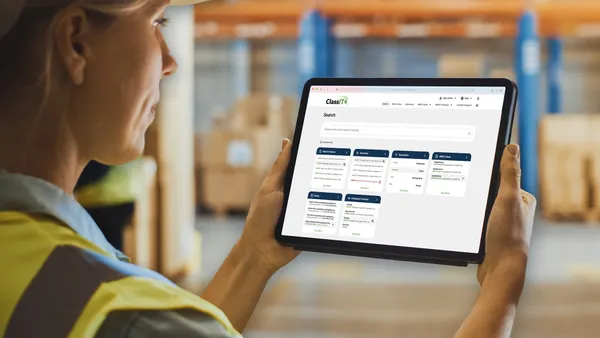This is a contributed op-ed written by Brian McCaffrey, production operations manager at Rockwell Automation. Opinions are the author's own.
What manufacturing company doesn’t rely on a trusted supply chain to deliver its goods?
While regulated industries are legally required to maintain traceability throughout their networks, manufacturers across any industry share a common goal — deliver quality products. Traceability is the best way to minimize risk for manufacturers by ensuring that all products shipped meet quality standards.
Many businesses today rely on a global network to feed their supply chain, pulling products and materials across borders and from every part of the world. The supply chain is its own complex ecosystem that requires tracking and documenting products from raw materials to finished goods.
Supplier risk
In manufacturing, spikes in demand can often lead to material shortages. While manufacturers typically buy materials from established suppliers, they’ll sometimes purchase from other sources when specific parts aren’t available. Working with brokers to buy from less-established sources is not uncommon and often the only way a manufacturer can keep production lines going. But this method can open manufacturers to risk if they happen to get substandard parts.
That’s exactly the position Rockwell Automation was in when it experienced a jump in component parts for an electronic assembly and had to procure material from an external source. As a global manufacturer, the company runs 20 manufacturing plants and a product catalog of nearly 400,000 SKUs, producing component devices, controllers and visualization platforms, and custom engineer-to-order items.
Introducing a part from a new supplier into its ecosystem posed enormous risk to the company, customers and its affiliated supplier network.

Brian McCaffrey
Production Operations Manager, Rockwell Automation
Introducing a part from a new supplier into its ecosystem posed enormous risk to the company, customers and its affiliated supplier network. Responding immediately was important to understand the potential issue, contain the affected product and minimize impact to their customer base.
Without good information and traceability, the company could have faced a broad-sweeping product recall and significant time, effort and cost to contain the issue.
Digging into the details
Rockwell Automation’s manufacturing team embraced digital transformation early on. It unified operational technology and IT systems to house production data across all facilities, going plant by plant to standardize work processes and functions. And it was this intelligence the team used to dig into the quality issue and quantify just what happened in the supply chain.
Rockwell Automation was able to see what parts had gone into 35 unique print circuit board assemblies with the possibility of impacting more than 100 finished products, and it pinpointed final production catalog numbers the substandard parts had affected. This information enabled it to rework only the affected modules and not unnecessary ones.
The team then turned to the supply chain ecosystem to identify precise locations where the product had traveled throughout distribution centers and manufacturing facilities and specified serial numbers to pull back and rework the assemblies. The company was fortunate to have a solution process in place with necessary controls to contain a quality issue and confront it head-on.
End-to-end traceability
If Rockwell Automation didn’t have the power of traceability, the company would have been forced to conduct a full recall from all manufacturing facilities — pulling back everything produced within a specified date range.
Instead, it was able to isolate products in its distribution centers and manufacturing operations and just rework targeted products, minimizing disruption to operations and containing the issue 100% from the field supplier network and customers.
The team is working toward a future goal of complete, end-to-end traceability where it can track serial numbers from suppliers all the way to finished material.
Rockwell Automation is building out a connected supply chain to track product origin from all distribution channels and validate quality before parts even enter its ecosystem. The goal is to set up complete, end-to-end traceability from raw material suppliers to component suppliers, to manufacturing operations, distribution centers and the end customer. This operational intelligence creates a competitive edge, through the value of the supply chain and the traceability that ensures quality remains intact every step of the way.
This story was first published in our weekly newsletter, Supply Chain Dive: Procurement. Sign up here.













